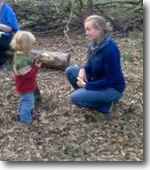 Sarah is a MSc Marketing graduate with a strong passion for nature and outdoor adventures. Growing up in Denmark she’s no stranger to natural surroundings and her parents frequently took her camping all over Europe which initially sparked her enthusiasm for the outdoors. She currently resides in West Yorkshire, England where she can often be found walking around the beautiful Yorkshire Dales. Sarah occasionally writes for Wilko’s lifestyle blog.
Sarah is a MSc Marketing graduate with a strong passion for nature and outdoor adventures. Growing up in Denmark she’s no stranger to natural surroundings and her parents frequently took her camping all over Europe which initially sparked her enthusiasm for the outdoors. She currently resides in West Yorkshire, England where she can often be found walking around the beautiful Yorkshire Dales. Sarah occasionally writes for Wilko’s lifestyle blog.
Today’s children have evolved beyond playing in the back garden as a way of having fun. To no surprise, National Trust report, there has been evidence of a long-term and dramatic decline in children’s relationship with the outdoors over the last decades. We know from the Government’s National Child Measurement Programme in England that, by the final year of primary school, 33.9% of pupils are either overweight or obese. With half term just around the corner, Wilko’s team asked the experts why outdoor play is so important, and what their tips were to make the outdoors fun. Here’s what they had to say.
Stuart Biddle, professor of Physical Activity and Health at Loughborough University explains environmental and social developments happen naturally over several decades and are therefore not easy to stop or modify. Our society has also benefited from them in am number of ways, however social environment and culture have a profound impact on how we act, and we therefore need to make it socially acceptable again to be outside and to make sure physical activity is a part of our children’s lives.
Nature Play
 Clare Caro is a nature enthusiast believes that playing outside is vital for children, not only to live a healthier life but also to stimulate brain growth and development through imagination, creativity and exercise.
Clare Caro is a nature enthusiast believes that playing outside is vital for children, not only to live a healthier life but also to stimulate brain growth and development through imagination, creativity and exercise.
Clare believes that people are becoming more aware that we have a national problem, so she has kindly shared her best advice for getting children outside in the winter months.
Catch their attention
Clare argues that encouraging children to go play outside does not take much effort, but only a bit of adult suggestion of some good ideas. And working with your children on great outdoor projects may just surprise you.
Get social!
Just like Stuart Biddle, Clare Caro believes that social interaction is the key to change. It’s a good motivator and it helps shape the social and cultural norms in our society today. If we focus more on changing the way we think and act today, we can enjoy being outside more without it having to be forced upon us.
Clare suggests that you arrange to meet up in a group and go out and enjoy the outdoors together. By doing this you are making a commitment to others which will make it harder to cancel. Moreover, it will encourage change in behaviour and appeal to our natural human desire to belong and be accepted socially.
Learning by doing
Learning by doing is the best way to encourage change as Clare explains. You need to be a role model to your children through leading by example: “If you want your child to spend more time in nature, you have to set an example and go out yourself”.
Clare’s advice is to come up with a plan and, most importantly, stick to it. During the winter especially, we’re inclined to make up excuses for not going out, but according to Clare there is really no excuse for this.
Don’t force your children, let it come naturally
It’s important that your child feels comfortable with being outside and that should come naturally. It’s a natural reaction to be scared when you are taken outside of your comfortable environment, so you should not force your child to run off and play when outside. Let them get comfortable with their new surroundings and when they are ready, they will enjoy being outside for what it is. If you are there for support and safety, they will eventually find their natural imagination and desire to explore and play
Set a goal for yourself
It’s important that you set a goal for yourself so you don’t get demotivated. For example, if you have the goal of going out once a week with a group, then stick to it. It’s easy to let other things get in the way or use them as excuses for not going outside, but you will only disappoint yourself. However, outdoor activity should always fit naturally into your routine, not be forced in.
Clare explains, “You can’t force people to do something they don’t want to do. I think most people already know the benefits and advantages of being more active and spending time outside, but they need to do it out of their own gumption. If you are not ready or willing it will feel more like a punishment than a reward, which will have a negative effect on you which is essentially the opposite of what was intended”.
The best advice we can give is to be open-minded and give it a try – who knows, you might even enjoy it!
To learn more, read the full post on Wilko’s lifestyle blog here.
[registration_form]

As children most of our spare time was spent in the countryside locally. Mostly now built on. We lived off the land, i.e. eating peas, potatoes (blackened in a fire), kale stems etc. We left home straight after breakfast and returned after it got dark, summer and winter. We looked for birds nests, climbed trees, jumped over a local stream (also used for the removal of effluent from the sewerage works) and sometimes fell in. We built “dens” in the wood and played games. We got wet, cold and dirty, (we did not think we had had a good time unless we were in a dishevelled state). In other words, the countryside was our playground and learning centre. It was a great time in the 1950s, with sheaves of corn stacked in fields. Small fields with hedgerows and crab apple trees. Collecting the apples for crab apple jelly was a seasonable pastime. Blackberry collecting for pies. This area is now destroyed for housing and giant sheds. There is no-where for local children to explore the countryside in the area now. Those that are lucky enough to live in or near the countryside do not seem interested in what they have. I suppose their parents do not have the experience of the countryside either? Progress? But which way?
This may seem a long way out but does not the management of our hedges go a long way to lack of play areas! Where are the mixed hedges with the Crab Apples, Rose Hips, Sloes and Brambles these days! Stewardship has destroyed many a good hedge. Layed with only Hawthorn planted. When I told a farmer he should be planting Gorse for the Linnets to nest in he was shocked. ‘Hawthorn is much easier to plant’ was his reaction. Get the kids out collecting Rose Hips if they can find them for Rose Hip Jelly which they then take to stop their colds and coughs not to mention itching powder down Mark’s back!
Mark,
Interesting blog, but maybe does not go far enough! There is now a growing body of evidence that outdoor wild play is vital for emotional & social development, as well as physical health. But importantly for us as conservationists, children who do not get those close-up experiences of nature are much less likely to have a later love and concern for the environment. This means less conservationists, (even) fewer biological recorders and less supporters & members of all the wildlife charities. We all need to engage more with children and their parents to enjoy nature and care for it
Pete